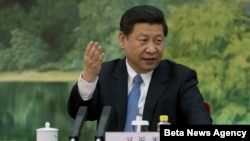In another push to stem corruption, China banned radio and TV ads promoting gift giving, according to a story published Wednesday in the China Daily.
Citing a circular issued by the State Administration of Radio, Film and Television (SARFT), the report said advertising luxury goods, such as expensive watches and gold coins, “publicized incorrect values and helped create a bad social ethos.”
SARFT is a censorship body that was established after the Communist Party took power to ensure that cultural products were in accord with the ideological and political aims of the party.
The move to ban certain ads comes as the lunar new year celebrations approach and is another in a line of efforts by Chinese authorities to root out corruption, something the Chinese Communist Party has publicly acknowledged as a life or death struggle.
During last November’s party congress, outgoing president Hu Jintao gave a warning about the effects of corruption.
"Opposing corruption and building an honest and clean government is a clear stance the party has been adhering to and is an important political issue the people have been paying attention to," he said. "If we fail to handle this issue [corruption] well, it could prove fatal to the party and even cause the collapse of the party and the fall of the state."
In January, the eastern city of Ningbo and three other municipalities in the progressive southern province of Guangdong enacted a requirement from the central government that officials publicly disclose their assets.
In December, China forbade high-ranking Chinese military officials from attending banquets and other events where alcoholic beverages are served. They also set limitations on the use of welcome banners, red carpets, floral arrangements, live performances and souvenirs.
Since becoming party chairman last November, Xi and the head of the party’s disciplinary commission, Wang Qishan, have been taking steps to crack down on corruption. Xi has pledged to go after both high- and low-ranking officials, and the party says it will launch a major anti-corruption plan.
He Bing, assistant dean of the law school of the China University of Political Science and Law, says what China needs is a breakthrough, and that the country’s leader in waiting, Xi Jinping, knows the crisis his ruling party is facing.
“Xi is like any other leader, like President Obama -- once he assumes power he needs to take action," He said. "As new leaders they introduce severe new measures and changes and take a more aggressive approach.”
Corruption became a hot topic in China in the wake of the Bo Xilai scandal, which rocked the nation last year.
Bo has been accused of using his position to seek profits for others and of taking bribes either personally or through family members. His wife, Gu Kailai, has been convicted of murdering a British businessman over a financial dispute. His former ex-police chief, Wang Lijun, was convicted of trying to cover up the murder.
Citing a circular issued by the State Administration of Radio, Film and Television (SARFT), the report said advertising luxury goods, such as expensive watches and gold coins, “publicized incorrect values and helped create a bad social ethos.”
SARFT is a censorship body that was established after the Communist Party took power to ensure that cultural products were in accord with the ideological and political aims of the party.
The move to ban certain ads comes as the lunar new year celebrations approach and is another in a line of efforts by Chinese authorities to root out corruption, something the Chinese Communist Party has publicly acknowledged as a life or death struggle.
During last November’s party congress, outgoing president Hu Jintao gave a warning about the effects of corruption.
"Opposing corruption and building an honest and clean government is a clear stance the party has been adhering to and is an important political issue the people have been paying attention to," he said. "If we fail to handle this issue [corruption] well, it could prove fatal to the party and even cause the collapse of the party and the fall of the state."
In January, the eastern city of Ningbo and three other municipalities in the progressive southern province of Guangdong enacted a requirement from the central government that officials publicly disclose their assets.
In December, China forbade high-ranking Chinese military officials from attending banquets and other events where alcoholic beverages are served. They also set limitations on the use of welcome banners, red carpets, floral arrangements, live performances and souvenirs.
Since becoming party chairman last November, Xi and the head of the party’s disciplinary commission, Wang Qishan, have been taking steps to crack down on corruption. Xi has pledged to go after both high- and low-ranking officials, and the party says it will launch a major anti-corruption plan.
He Bing, assistant dean of the law school of the China University of Political Science and Law, says what China needs is a breakthrough, and that the country’s leader in waiting, Xi Jinping, knows the crisis his ruling party is facing.
“Xi is like any other leader, like President Obama -- once he assumes power he needs to take action," He said. "As new leaders they introduce severe new measures and changes and take a more aggressive approach.”
Corruption became a hot topic in China in the wake of the Bo Xilai scandal, which rocked the nation last year.
Bo has been accused of using his position to seek profits for others and of taking bribes either personally or through family members. His wife, Gu Kailai, has been convicted of murdering a British businessman over a financial dispute. His former ex-police chief, Wang Lijun, was convicted of trying to cover up the murder.












